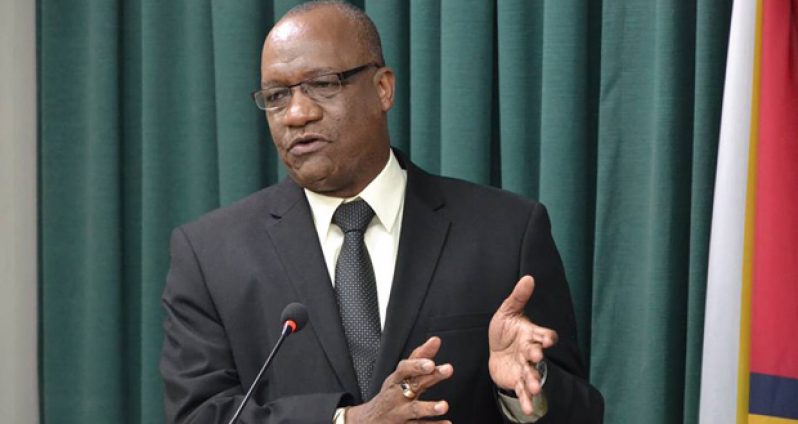NATIONAL unity is no longer an option for the government, but rather a requirement which must be realised in this existing multi-ethnic society, says Minister of State Joseph Harmon.
He was at the time speaking at a post-Cabinet press briefing held yesterday at the Ministry of the Presidency at Shiv Chanderpaul Drive. Responding to questions about whether the government will consider the conditions laid out by the opposition People’s Progressive Party (PPP) for any form of unity talks, Harmon maintained an earlier position that the coalition government remains open to national unity talks with the PPP, even with the possibility of them (government) examining the conditions of the PPP objectively.
However, he observed that the preferred route of the PPP is to ventilate their position through the media, but as a responsible party, if the PPP has concerns regarding this issue, there are appropriate mechanisms through which they can express this.
“They can write [to] the government or the Leader of the Opposition himself has access to the President through which those things can be communicated,” he said, adding that this is the way responsible parties operate.
“You don’t just get up on a Monday morning and decide that national unity can’t work because of A, B, C and D and release it in the newspaper. If you are serious about national unity, you don’t just get up and change the goal post,” Minister Harmon stated.
OPEN TO CONVERSATION
But the executive arm will not play around with words and according to Harmon, the government takes seriously their engagements with stakeholders, issues of national importance which are geared towards moving Guyana forward. And for this reason, they remain open to conversation with the PPP on the issue of national unity.
He reflected too on the role of the Ministry of Social Cohesion which he said was not established as a “gimmick,” but to demonstrate the seriousness which the government places on national unity and fostering social cohesion in a multi-ethnic and multi-cultural society.
In that light the government is actively pursuing ways to erode the divisive culture of racism and classism which has over the years plagued Guyana’s historical identity.
At the May 11 polls the PPP secured 202,000 votes, with most of these votes being recorded in Indo-populated areas. The APNU+AFC coalition on the other hand gleaned a winning 207,000 votes from more diverse communities through a campaign of national unity.
Against this setting, the minister told reporters yesterday that it has been recognised at all stages that what is needed in Guyana is a ‘Government of National Unity’ since no party contesting the last General Elections can claim an absolute majority.
“We did not believe that any party gaining 51, 52 or 53 per cent of the votes can claim that they have 100 per cent,” he said, noting that in some democracies when some parties are awarded 30 per cent of the votes they celebrate.
He cited the case of the winning party in the recently held elections in Canada which only received thirty-something per cent of the votes because of the electoral structure.
As such, he reiterated that with the disparity in voting choices, and the neck-in-neck situation which usually exists at general elections, no party should claim absolute majority, which reinforces the need for a national unity front.
Not where we should be in 2015
“Unless we are able to engage the energies of all Guyanese, then we would never be able to move this country at the pace which is required for us to catch up with the rest of the world. We are, based on our resources and our geographic space, not where we should be in 2015,” he pointed out.
Singapore was used as his measuring rod to highlight the fact that this country, which had gained independence a year before Guyana, had achieved the rank of a first world country in 2014, while Guyana remains listed as a third world country.
But this was achieved by Singapore because there was heavy investment in the human capital of the country, particularly the public service, Harmon said. Following suit, he disclosed that this is what Guyana is currently doing. The move to establish a Public Service Staff College, he noted, is an indication of this effort.
He also acknowledged that there is no need to reinvent the wheel in several initiatives in an attempt to move a country forward, since there are successful examples and precedents in the world on how this can be achieved.
By Ravin Singh













